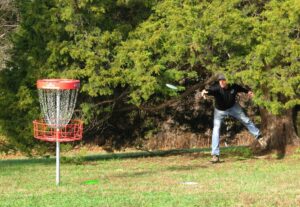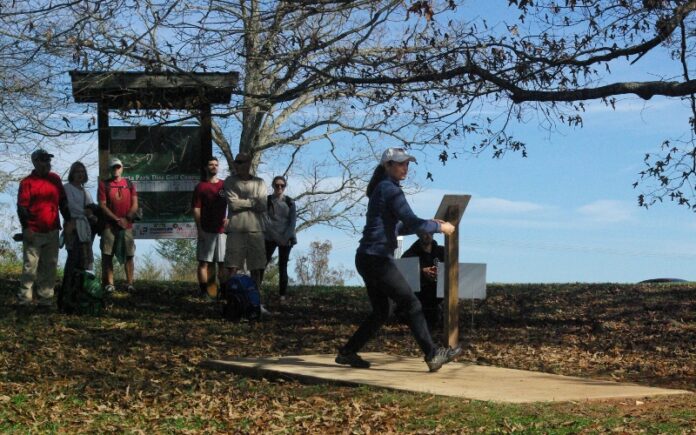The Moneta Madness Disc Golf Tournament was played Saturday at Moneta Park in Bedford, Virginia. Originally scheduled for last spring the tournament was delayed due to the Covid-19 virus. Seventy-two players were entered in several categories based on gender, year of birth and in some cases skill level.
The tournament was jointly sponsored by the Rotary Club of Smith Mountain Lake and the Roanoke Disc Golf Club. The tournament was a charity event collecting a van full of food for Lake Christian Ministries.

The disc golf course has been recently renovated by the Rotary club for the Bedford Parks and Recreation. It is proving to be one of the best coursed in the region offering a rolling hill setting with spectacular views and some challenges. Most players complimented the course and also complemented the tournament organization by the Roanoke club. The Rotary Club provided the players with a free breakfast and an inexpensive hot lunch.
The tournament consisted of two rounds of the 18 hole course. Players traveled from across Virginia and included a number from North and South Carolina, West Virginia, Delaware and Pennsylvania to play in the tournament. Even Paul McBeth, the 2019 Professional Disc Golf Champion was spotted caddying for his wife Hannah.
The results for the tournament held on Saturday. November 14th can be found below as well as some information on disc golf taken from the Professional Disc Golf Association web site for general information.
2020 Moneta Madness PDGA Disc Golf Tournament Results
A total of 72 players were entered into several categories based on gender, year of birth and in some cased skill level. The below results lists the first three players in each category from the Moneta Madness tournament. The number in parentheses next to the category is the number of players in that category.
Open (12)
Player Par Hole Total
| 1 | Hunter Thomas | -10 | 51 | 53 | 104 | |||||||||||
| 2 | Ryan Shumate | -8 | 53 | 53 | 106 | |||||||||||
| 3 | Neil Bishop | -6 | 54 | 54 | 108 | |||||||||||
Open Women (1)
Player Par Hole Total
| 1 | Hannah McBeth | +13 | 61 | 66 | 127 |
Pro Masters 40+ (6)
Player Par Hole Total
| 1 | Greg Clemons | -1 | 54 | 59 | 113 | ||||
| 2 | Jim Conrad | -1 | 58 | 55 | 113 | ||||
| 3 | Mark Gill | E | 59 | 55 | 114 |
Advanced (14)
Player Par Hole Total
| 1 | Thomas Grigg | -8 | 53 | 53 | 106 | ||||
| 2 | Alan Best | -7 | 56 | 51 | 107 | ||||
| 3 | David Allen | E | 58 | 56 | 114 |
Amateur Masters 40+ (4)
| Player Par Hole Total | |
| 1 | Lloyd Seely | +4 | 60 | 58 | 118 | ||||
| 2 | Daniel Smith | +4 | 61 | 57 | 118 | ||||
| 3 | Jeff Peters | +17 | 65 | 66 | 131 |
Amateur Masters 50+ (5)
| Player Par Hole Total | |
| 1 | Jan Jackson | +14 | 65 | 63 | 128 | ||||
| 2 | Kyle Greene | +18 | 66 | 66 | 132 | ||||
| 3 | Steve Hardin | +19 | 66 | 67 | 133 |
Intermediate (6)
Player Par Hole Total
| 1 | Connor High | -2 | 58 | 54 | 112 | ||||
| 2 | Joshua Wyatt | +7 | 59 | 62 | 121 | ||||
| 2 | Spenser Foley | +7 | 58 | 63 | 121 |
Intermediate Women (1)
Player Par Hole Total
| 1 | Kinnakaye Kinnaird | +37 | 72 | 79 | 151 |
Recreational (23)
Player Par Hole Total
| 1 | Ronald Davis | +6 | 59 | 61 | 120 | ||||
| 2 | Tim Dushaw | +7 | 60 | 61 | 121 | ||||
| 3 | Leo Stevens-Lubin | +8 | 62 | 60 | 122 |
What is Disc Golf?
Disc golf is played much like golf. Instead of a ball and clubs, though, players use a flying disc or Frisbee®. The sport was formalized in the 1970s and shares with golf the object of completing each hole in the fewest strokes (or, in the case of disc golf, fewest throws).
A golf disc is thrown from a tee area to a target, which is the “hole.” The hole can be one of a number of disc golf targets; the most common is an elevated metal basket. As a player progresses down the fairway, he or she must make each consecutive throw from the spot where the previous throw landed. The trees, shrubs, and terrain changes located in and around the fairways provide challenging obstacles for the golfer. Finally, the “putt” lands in the basket and the hole is completed.
Disc golf shares the same joys and frustrations of golf, whether it’s sinking a long putt or hitting a tree halfway down the fairway. There are a few differences, though: Disc golf is often free to play in public parks, although pay-to-play courses are trending upward; you probably won’t need to rent a cart, but converted golf course layouts are also on the rise; and your “tee time” will usually come during tournament competition, not casual play.
Who Plays Disc Golf?
Disc golf is designed to be enjoyed by people of all ages, gender identity, and economic status, making it a great lifetime fitness activity. Because disc golf is so easy to learn, no one is excluded; players merely match their pace to their capabilities and proceed from there.
What is the Professional Disc Golf Association?
The Professional Disc Golf Association (PDGA) is a membership-based organization boasting more than 120,000 lifetime members across 54 countries. The PDGA is also the governing body for the sport and sanctions competitive events for players of every skill level. There are more than 8,000 disc golf courses worldwide, with more being installed every day.
PDGA Tour Player Classifications & Divisions
The PDGA Tour Player system is based on Professional, Amateur, and Junior Divisions with both Mixed divisions (Male & Female) and female-only divisions. Professionals compete for money, Amateurs and Juniors for trophies and prizes.
Professional Divisions are based on gender and year of birth, while Amateur Divisions are based on gender, year of birth, and in some cases, skill level. Divisions that have the letter M in their code are “Mixed” divisions where both males and females may play. Divisions that have the letter F in their code are “Female-only” divisions in which only females may play.
Male and Female Pro players may compete in nine age-based pro divisions, based on their year of birth: Open – under age 40 (MPO), Pro Master 40+ (MP40), Pro Master 50+ (MP50), Pro Master 55+ (MP55), Pro Master 60+ (MP60), Pro Master 65+ (MP65), Pro Master 70+ (MP70), Pro Master 75+ (MP75), and Pro Master 80+ (MP80). Players may play in younger divisions if they wish or if their age-based division is not offered.
Female Pro players may also compete in seven female-only age-based pro divisions, based on their year of birth: Open – under age 40 (FPO), Pro Master Women 40+ (FP40), Pro Master Women 50+ (FP50), Pro Master Women 55+ (FP55), Pro Master Women 60+ (FP60), Pro Master Women 65+ (FP65), and Pro Master Women 70+ (FP70).
Amateurs have similar age-based divisions but may also be grouped based on skill and PDGA Player Ratings, into Advanced, Intermediate, Recreational, and Novice division levels.
Junior (<=18) aged boys and girls are divided into six groups based on a player’s year of birth: Junior ?18, Junior ?15, Junior ?12, Junior ?10, Junior ?08, Junior ?06. These divisions are also offered in Mixed (Male & Female) divisions and Female-only divisions.

